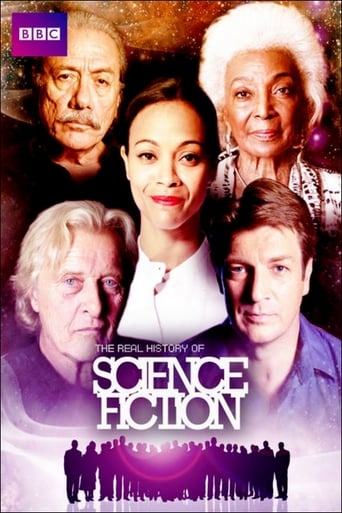l_rawjalaurence
This four-part series, produced to mark the BBC's science fiction season, is slightly misleading in tone; it is not a history of science fiction, but rather a history of modern science fiction adaptations on film and television. Presenter Dominic Sandbrook pays scant attention to the major antecedents of the genre: Jules Verne, H. G. Wells, Mary Shelley et. al. He is far more interested in looking at popular works of film and television such as STAR WARS, DOCTOR WHO, FRANKENSTEIN, and their effect on contemporary popular cultures. Some of the assertions he makes are quite suggestive; the STAR WARS and STAR TREK epics, for example, he sees as contemporary rewritings of the old naval narratives (e.g. Hornblower) popular in the mid-twentieth century, while futuristic epics such as BATTLESTAR GALACTICA return us to the age of progress and enlightenment characteristic of the Victorian era.Interspersed with Sandbrook's presentation are a series of interviews with personalities from the world of SF - novelists such as Neil Gaiman and Ursula K. Le Guin, and actors such as David Tennant, Richard Dreyfuss and Keir Dullea, and technicians such as Douglas Trumbull. All their reminiscences are interesting enough; but do not help to dispel the suspicion that Sandbrook isn't really interested in SF as a genre working across a transmedial platform embracing print and online as well as cinematic and televisual cultures. Rather he is interested in compiling a series of programs giving viewers the chance to take a nostalgic wallow in their favorite memories from their youth, and how such memories continue to shape their present lives.As a series of celebratory programs, TOMORROW'S WORLDS is watchable enough, but a serious history it certainly ain't. Sandbrook cuts a pleasant figure on screen, but he lacks the panache and wit of some of the real masters of television documentary presentation such as Andrew Graham-Dixon.
pkpera
The title is pretty much misleading, or just incorrect. It starts with some famous actors and is focused on SF movies and TV serials, in 98% time approx. From 4 announced corners (Robots, Space, Invasion, Time travel) I seen so far first 2. There were some interesting fact mentioned, like influence of movie Silent Runner on George Lucas and Star Wars. But in Robot episode there was really little talk about SF literature. Of course, they cited Asimov's 3 laws of Robotic - but what about European writers ?Little better was at start of Space episode - at least they mentioned Verne, Wells .. Still, literature was just marginally touched. It is shame, especially as right at start was said that history of SF is history of imagination. Watching movies is not imagination. Reading books is. But it seems that nowadays it gets forgotten.What's that WH in summary - Western Hemisphere :-) There were some nice movies, TV serials made in EU - completely ignored.


